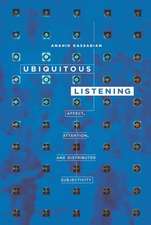Worlds Unbound: The Art of teamLab
Autor Laura Leeen Limba Engleză Hardback – 8 apr 2022
Worlds Unbound introduces and contextualizes the artistic output of the Tokyo-based digital art collective teamLab, known for its electrifying installations that transcend boundaries between gallery, public space, and popular entertainment. In the twenty years since its founding in 2001, teamLab has grown into a global multidisciplinary collaboration with more than six hundred participants, including engineers, computer graphics animators, mathematicians, graphic designers, architects, artists, and computer programmers. With lavish illustrations throughout, this book provides a comprehensive overview of teamLab’s artistic vision and achievements, illuminating the remarkable scope of the group’s groundbreaking art and its fundamental contributions to the pivotal field of new media art.
Unpacking teamLab’s digital environments, from framed works animated on a loop to immersive environments that unfold in real time and respond to viewer behavior, Worlds Unbound illustrates how the collective uses the concept of interdependency to interrelate the natural world, participatory culture, and the digital art experience.
Preț: 311.43 lei
Nou
Puncte Express: 467
Preț estimativ în valută:
59.59€ • 62.22$ • 49.32£
59.59€ • 62.22$ • 49.32£
Carte disponibilă
Livrare economică 14-28 martie
Livrare express 28 februarie-06 martie pentru 101.12 lei
Preluare comenzi: 021 569.72.76
Specificații
ISBN-13: 9781789384499
ISBN-10: 1789384494
Pagini: 200
Ilustrații: 207 color plates
Dimensiuni: 170 x 244 x 41 mm
Greutate: 1.96 kg
Editura: Intellect Ltd
Colecția Intellect Ltd
ISBN-10: 1789384494
Pagini: 200
Ilustrații: 207 color plates
Dimensiuni: 170 x 244 x 41 mm
Greutate: 1.96 kg
Editura: Intellect Ltd
Colecția Intellect Ltd
Notă biografică
Laura Lee is associate professor in the Department of Modern Languages and Linguistics at Florida State University. Her research centers on contemporary visual culture, including screen technologies and intermediality, with special emphasis on Japan.
Cuprins
Acknowledgements
List of Illustrations
Preface
Introduction
Part I
Chapter One
Ultrasubjective Space
Chapter Two
Japan and Nature
Part II
Chapter Three
Techno-Ecology
Chapter Four
Interactivity and Co-Creation
Conclusion
Epilogue
Interview
Notes
Bibliography
Index
List of Illustrations
Preface
Introduction
Part I
Chapter One
Ultrasubjective Space
Chapter Two
Japan and Nature
Part II
Chapter Three
Techno-Ecology
Chapter Four
Interactivity and Co-Creation
Conclusion
Epilogue
Interview
Notes
Bibliography
Index
















